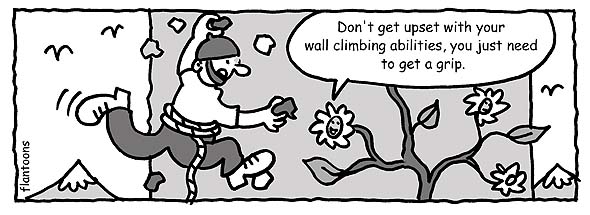
Fred is being invited by his buddies (friends) Jeff, Nicole, and Selina to go to a soccer game. It has been a while since the four have had an opportunity to spend time together. Read their conversation then answer the questions below:
Jeff : Hey Fred, have any plans tomorrow? Nicole, Selina, and I are all going to watch Manchester United play Chelsea in London. We have an extra ticket. You interested in tagging along?
Let: The word "let" means the same as "allow" or "give permission." e.g. "My mother won't let me get my ears pierced until I'm 15."
Make: The word "make" means the same as “"force" or "cause to happen / cause to feel something." e.g. "My boss made me stay late every day this week!"
A really great way to learn new vocabulary is to learn words in pairs, like opposites.
For example if you learn ‘happy’ you pair it with ‘sad’.
Each sentence below has an adjective missing, the opposite to the one in brackets. Can you complete the sentences correctly? Good luck!
Here are some idioms to revise, all of which are related to food and eating. First look at the literal meanings of the idioms below and then see if you can decide which idiom correctly completes the sentence. Who is the apple of your eye? Is there something that just isn't your cup of tea?
Good luck!
Yesterday we took a lesson on 'off' phrasal verbs. Today we'll continue by looking at some interesting phrasal verbs ending with 'down'.
Look at the context of each sentence and choose the correct definition. Good luck!
By Seb, EC Cape Town English school
English has a large number of phrasal verbs, many of which use the preposition 'off.'
For example, 'run off' means to leave suddenly and unexpectedly: "I have to run off now or I will be late."
We recently had a lesson on off phrasal verbs, now it's time for more.
Look at the context of each sentence and choose the correct definition. Good luck!
Here is the last in my series of 'new verbs' lessons! The verb from each sentence is missing; which verb do you think fits the gap? I hope you have learnt some new vocabulary each week and have practised using it in every day conversation. If you missed the last lessons, just click on the links below. Good luck!
PS: I could only think of phrasal verbs that begin with z. Can you think of any verbs that start with this letter?
Take a look at these ten words. They are all used to describe people and the role they play in our lives. How may of them do you know?

This cartoon is based on the idiom get a grip.
Get a grip means to understand how to deal with something or to control your emotions.
Examples:
"This book really helped me get a grip on politics."
The following questions about marriage each contain one or two mistakes. Do you know what they are? Rewrite the correct sentences in the comments area. You can also read the correct sentences by clicking below the 15 sentences.
e.g. Does you believe on love at first sight?
Do you believe in live at first sight?